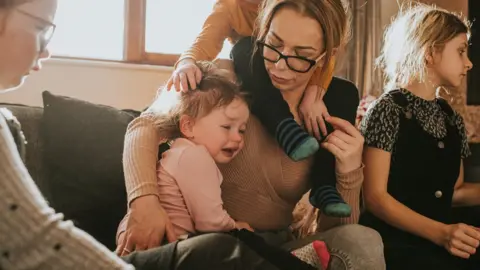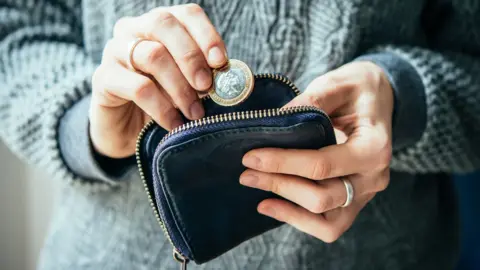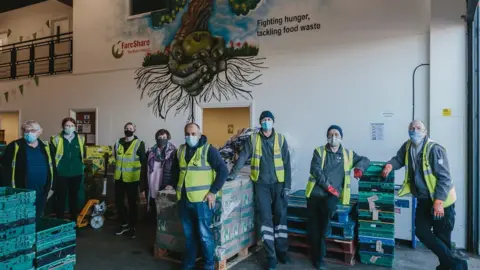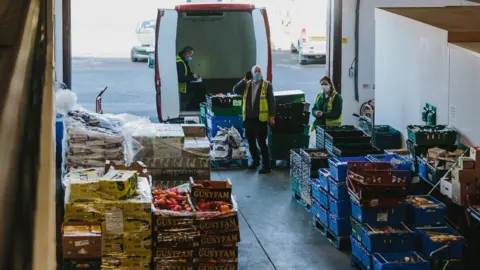Rising living costs 'crippling people in Northern Ireland'
 Catherine Falls/Getty Images
Catherine Falls/Getty ImagesRising living costs are financially, emotionally and physically "crippling" people in Northern Ireland, according to a local community worker.
The increasing cost of household bills, fuel and childcare, along with the uncertainty and impact of the Covid-19 pandemic, have hit many families hard.
Low-paid workers, in particular, are facing "a very bleak winter", said the manager of Strabane Community Project.
"We're going to see poverty at a whole different level," she told BBC News NI.
Ursula Doherty runs a number of community projects in Mid Ulster, including a social supermarket which allows people to purchase low-cost surplus food, usually about 70% cheaper than on the high street.
Strabane Community Project also facilitates a meals-on-wheels delivery service which provides hot dinners to the elderly and vulnerable, at a reduced cost.
But Ms Doherty says that as general life gets more expensive, all the community sector is doing is "putting a plaster over a massive problem".
"What we're going to see is hunger - it's desperate," she said.
"Food boxes [such as those from food banks] serve no purpose in the long run - they are just sticking plasters.
"The government needs to realise we can't keep giving food boxes when we're not actually dealing with the problems that lead to people needing them.
"Social supermarkets aren't sustainable either, but they help people who need it and teach people to manage their situation a bit better."
 Getty Images
Getty ImagesMs Doherty says there is a change in the sorts of people needing extra support.
"What we are seeing coming through more often is working people who are receiving a salary but can't afford basic items because of their low wages.
"People on multiple benefits are not in poverty. It is people on single benefits, such as universal credit, who have taken a cut, and people working in low-paid jobs and those needing to pay for childcare.
"If you are having to pay more for fuel for your house and then fuel for your car to get to work, it's very difficult. It's consumer poverty.
"We need a whole system overhaul. We need more money for education because it is an equaliser.
"People need new skills, they need reskilled in the areas that need more workers, low-paid people need higher wages and there needs to be more affordable childcare options if people are to get out of this."
Ms Doherty is urging politicians "to wake up and see what's happening out there".
"The dignity, respect and social justice has been stripped away from people," she said.
"The community sector can only do so much and we're close to burnout. Where do we go from here without the right government help? We can't keep giving out, we need to create a more sustainable environment.
"People are pushing rocks up a hill. None of what we're doing is the answer."
 FareShare NI
FareShare NIIt is a similarly grim picture at the FareShare Northern Ireland warehouse in Newtownabbey, County Antrim.
The Homeless Connect project, which works to alleviate food poverty across Northern Ireland, supplies more than 160 charities with weekly food deliveries, with support from the Department for Communities.
It supplies food to homeless hostels, school breakfast clubs, lunch clubs for senior citizens, day centres and community cafés, and it is desperately seeking volunteers to help the growing number of people in need.
"In 2020-21, we redistributed 800 tonnes of food, the equivalent of 1.9 million meals, which was more than double the year before," Méabh Austin, development manager at FareShare Northern Ireland, told BBC News NI.
"We have seen demand for surplus food continue at a similar level this year as the economic impact of the pandemic is felt."
'Children come into school hungry'
Harpur's Hill Primary School in Coleraine, County Londonderry, is among those to receive support from FareShare.
It is in the Cross-Glebe ward, which is in the top 15% of the most deprived areas in Northern Ireland, and 56% of its pupils receive free school meals.
"Many of the children come into school hungry and as a result we run a breakfast club and nurture room," said school principal David Radcliffe.
"The extra food we get from FareShare enables us to provide breakfast to those children who come into school hungry."
The school has also started supporting families in need by supplying weekly food parcels.
 FareShare NI
FareShare NILike Strabane Community Project volunteers, those at FareShare Northern Ireland are noticing that rising fuel and electricity costs "have left low income families and people on benefits particularly vulnerable to food insecurity".
Food insecurity is the disruption of food intake or eating patterns due to a lack of money or resources.
"We redistribute good quality, surplus food to charities that turn it into meals," said Ms Austin.
"The food we receive from food retailers and producers includes fresh fruit and vegetables, dairy products, bread and fresh meat, as well as frozen and tinned items."
'Millions of people are struggling'
Demand is so high that the charity's five vans are on the road Monday to Friday, distributing food across Northern Ireland.
"Hundreds of thousands of tonnes of good food is wasted by the UK food industry every year," she said.
"At the same time, millions of people are struggling to afford to eat.
"Our work addresses these two issues by redistributing food industry surplus, which would otherwise go to waste, to the people who need it most."
But these groups cannot continue without more support.
If you have been affected by the issues raised in this story, help and support can be found at BBC Action Line.
